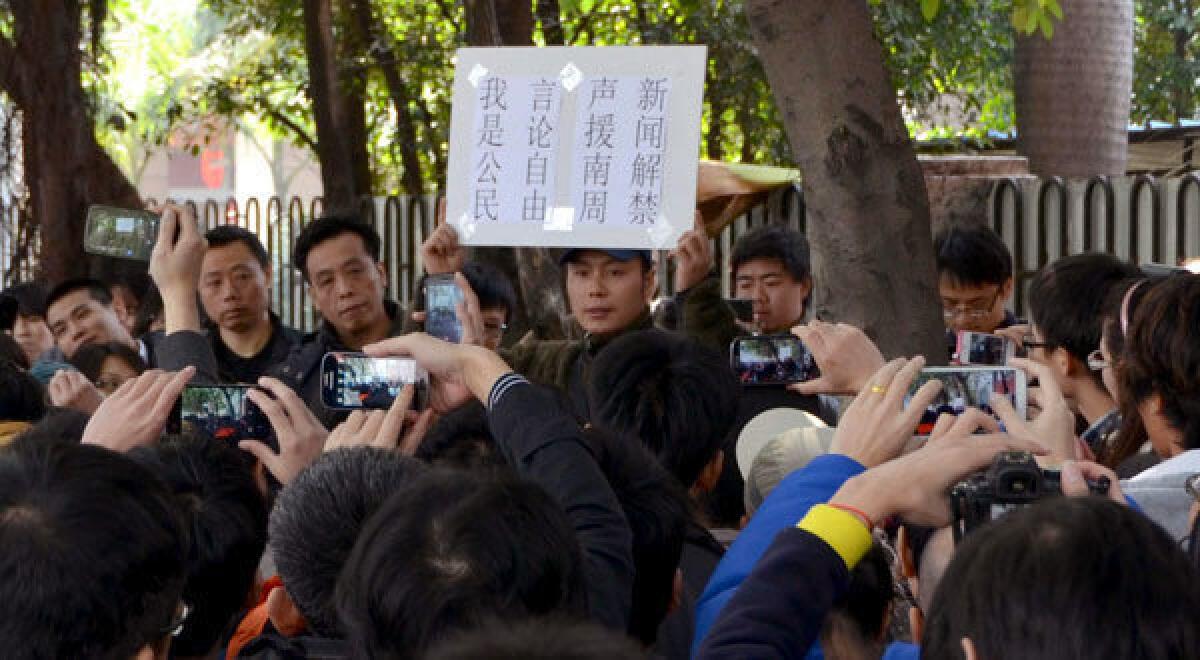China newspaper dispute sparks protest, tests new leaders

BEIJING -- A spat over a censored New Year’s editorial in a leading newspaper has quickly escalated into a widening challenge to the Chinese government’s limits on media freedoms.
Journalists at the muckraking Southern Weekly have staged a strike and called for the resignation of a provincial propaganda chief accused of rewriting a front-page editorial on political reform to reflect loyalty to the ruling Communist Party.
The incident has sparked outrage among prominent scholars, intellectuals, celebrities and university students who have voiced their support online for the newspaper since the edited article was published Jan. 3.
On Monday, hundreds of people staged a demonstration outside the Southern Weekly’s headquarters in Guangzhou, carrying flowers and signs calling for a relaxation of censorship.
Demands for wider freedoms ordinarily go unanswered in China, but the controversy comes at a time when the country is recalibrating itself for its new leader, Xi Jinping.
The Southern Weekly’s home province of Guangdong has a new party secretary, and Beijing recently installed a new central propaganda chief.
Experts say their response, if any, could set a precedent for how the new administration handles political challenges.
“This is happening at a good time because leaders have just taken their posts,” said Zhan Jiang, a professor of journalism at Beijing Foreign Studies University. “There’s a power vacuum.”
Recent evidence, however, suggests that China is in no rush to reform its control over information.
A law was passed last month requiring Web users to register their identities -- a move critics say is aimed at discouraging criticism of the government and news about official corruption.
Last week, a website belonging to a closely followed political magazine, Yanhuang Chunqiu, was shuttered after it posted an article on constitutional rights.
“I haven’t seen any indication the new administration is any more concerned with issues of a stronger press or freedom of press than previously,” said Jeremy Goldkorn, editor of Danwei.com, a website about Chinese media.
The Southern Weekly is no stranger to censorship. The newspaper belongs to the Nanfang Media Group, whose publications have a reputation for investigative journalism that regularly irks the authorities. Reporters and editors have been fired on several occasions for their work.
In 2003, the group’s Southern Metropolis Daily reported on SARS when officials were still trying to cover up the extent of the disease.
The journalistic daring has led to greater scrutiny by the provincial government, which is the parent owner of the Nanfang Media Group. (All media in China have state involvement.)
Tensions between the editorial staff and censors have worsened in the last year after Tuo Zhen was named Guangdong propaganda chief. The ambitious former journalist thought to be in the running to head China’s official news agency sought to rein in Nanfang’s aggressive style, Zhan said.
In 2012 alone, 1,034 articles in the newspaper had been censored to some degree, according to a statement by the Southern Weekly editorial department. (Journalists at the Southern Weekly contacted for this article declined to comment).
Tensions eventually came to a head when Tuo revised the Southern Weekly’s traditional New Year’s address, which this year had focused on guaranteeing constitutional rights.
The new editorial penned by Tuo retained the newspaper’s staff byline but was reworked as a celebration of Xi’s vision of a national revival entitled, “We are closer to our dream than ever.”
Instead of silencing the initial editorial, Tuo’s interference set off a torrent of criticism on China’s frenetic micro-blogs.
Discussion about the controversy was still percolating online Monday despite the quick work of censors.
Among the most viewed posts was one by actress Yao Chen, who quoted Russian dissident Aleksandr Solzhenitsyn to her 32 million followers: “One word of truth outweighs the whole world.” Below the message, she attached the Southern Weekly logo.
ALSO:
Philippines may end hunt for treasure looted by Marcos
Britain extradites terror suspect to face trial in New York
Indian prosecutors will seek death penalty in gang-rape case
More to Read
Start your day right
Sign up for Essential California for news, features and recommendations from the L.A. Times and beyond in your inbox six days a week.
You may occasionally receive promotional content from the Los Angeles Times.







